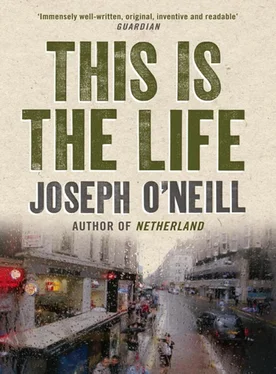As I have said, leafing through the sheaf of papers I had no doubts: this was a major new work. I made a calculation: Donovan’s last book (the third edition of his text-book) had come out in 1980, which meant that he had been working on this new book for almost ten years.
I went cold. I had to have a copy.
I began searching around the office. I opened drawers and ran through heaps of documents. I scoured and rummaged and exhaustively ransacked (I cringe when I think of my molestful, unconscionable actions!), and at last I uncovered the floppy disc I was looking for. Quickly I activated the word processor. Up flashed the Introduction to the book, showing up on the monitor in green, painful letters. The Introduction, which was twenty-three pages long, would have to be enough. There was no question of printing out the whole text.
Minutes later I switched off the computer and slipped into my raincoat. Under my arm was the bundle of papers that I had printed out, and it was time to be on my way. Then, instead of leaving, I behaved disgracefully.
As I walked out of the study I saw that the door to the adjoining room was ajar and that inside was an unmade double bed. Without the slightest hesitation I went in. It was their bedroom. By the high windows Arabella’s toiletries filled the surface of a dressing-table. Shamelessly I surveyed bottles of scent, mascara sticks, cotton buds for cleaning ears, several powder brushes, lipsticks and bottles of baby lotion. (Yes, unbelievable as it may seem, that is what I did. As I write now and feel myself back in that house, grubbily sifting through those private belongings with my sweating, blotchy hands, rifling around in breach of trust, in my raincoat, a hot, ineradicable shame fills me to the brim. Inexcusable! My behaviour was inexcusable!)
I looked around. On the bedside table stood a photograph in a glass frame. I picked it up and studied it. It was a strange photograph, really. It showed the top half of a woman. She was wearing a huge circular straw hat, and its disc covered almost her entire back. There was no sign of her face or her hair, and what revealed her to be a woman were the bare, bangled arms that protruded outwards and upwards from the side of the hat, fingers outstretched — slender, hairless arms that could only belong to a woman. Arabella. It had to be. She was looking out to the sea, the bar of blue with a sun-burned, yellow-rocked island on its rim. It was clear that this was a holiday snapshot, but that was all that I could deduce. I tried to read more into it, but all I came up with was that this was Arabella on holiday. Any guesses or theories I entertained (about her looks, about why Donovan might like this picture) just bounced off the photograph as though it were a mirror.
Feeling locked out and frustrated, I put the photograph down and went over to a big white wooden cupboard. Its wellmade door slid open with just a push of the finger. One half of the cupboard, with the exception of two dresses, a thermal vest and some tinkling clothes-hangers, was deserted, while in the other half were suspended some suits and shirts. Some more clothes were scattered about the room, including a clean, wrinkly mountain of whites by an opened ironing-board. A bathroom joined the bedroom and I went in there, too. Inexplicably (what could I have been thinking of?), I rooted around the aftershaves and moisturizers and toothbrushes. Of course, I found nothing of interest. Undeterred, I climbed the stairs to the third floor. What could a childless couple do with such a big house? I asked myself. Unsurprisingly, the rooms were simply used as guest rooms or as spare rooms filled mostly with books and suitcases. What did I do? I rummaged around. I opened trunks and unpacked boxes, I pried and snooped and intruded. Needless to say, my discoveries were banal: old clothes, tool-boxes, old novels, spare rugs, bicycle tyres.
(Why did I not stop to think about what I was doing? And anyway, what was I expecting to find? Secret doorways? Diaries? Treasure? A message? Who did I think I was, one of those teenage sleuths in children’s thrillers, the ones who crack drugs rings on their holidays? What — no, who , possessed me that I did these things? I have said that Donovan unlocked me like an old house: who moved into me? Who was the new lessee?)
My intrusiveness did not end there. Before I left I went down to the telephone answering machine. You never know, I figured: there just might be something important. I depressed the button and, apart from Fergus Donovan’s old message, heard the following, spoken in ripe, emotional tones that I recognized: Michael, this is Arab. A hesitation as the speaker thought of what to say. Then, almost ferociously, Stop it. Just stop it. Another hesitation. Bye.
Given the way of things, it was some days before I actually perused Donovan’s work. Away from the heightened atmosphere of his study, I was disinclined to muster the concentration and time that was needed for the task. Also, I had other preoccupations which I could not simply brush aside. Foremost amongst these was my date with Susan.
The meeting was Susan’s idea, not mine. She telephoned me at work, out of the blue: to see how I was, she said. Then, awkwardly and bravely, she had suggested we meet. Not wishing to rebuff her, I quickly said, Yes, of course, good idea — and that was that. I had committed myself.
Saturday night, therefore, found me in a taxi on the way to a restaurant in Leicester Square, uneasy and a little anxious. I was profoundly unsure about the whole encounter. We had originally arranged to see each other the previous Saturday, but I had been forced to cancel because of my appointment to meet Donovan in Colford Square. I had telephoned Susan beforehand and begun apologizing profusely. She breezily interrupted me. There’s no need to explain anything, Jimmy,’ she said. ‘If you can’t make it, you can’t make it. That’s all there is to it.’
I hesitated. It was unlike Susan to make so light of such a thing.
She registered my surprise and said, ‘It’s not as though we owe each other anything, is it? The days of making excuses are gone, Jimmy.’
I hastily agreed. If one thing was clear in my mind, it was that I did not want us to resume our old relationship. That was over and done with, and a good thing too. In my recollection the inconveniences had clearly outweighed the satisfactions. What made me qualmish in the taxi was that Susan’s intentions were less clear. I suspected that what she wanted was, at the very least, some form of discussion about, and examination of, our time together. That was how she was, she had an almost archaeological approach to our relations — she liked to disinter them, hold them up for inspection, label and analyse them. It was a habit I had found tiring and disconcerting, and it was one reason why I associated Susan with a terrible weightiness; by the end I felt in her presence like a man deeply submerged, the air a far-off roof of light, the water like concrete. I made up my mind to take a firm grip of the evening. The talk was not to take any untoward direction.
I arrived at the restaurant, a place called Garfunkel’s, in good time. I had suggested the place. It was not a romantic venue: synthetic tabletops, harsh lights and a floor overcrowded with an unappealing clientele (students, parents with troublesome children, downmarket types generally). The food (steak and chips, scampi, beefburgers etcetera — ‘honest’ food, I think it is called) was on the fast side, which meant that the meal would not be lengthy. I took a seat at a table and ordered a bottle of house red. By the time Susan arrived (at eight on the dot) I had drunk two glasses and smoked three cigarettes.
I watched her peer around the numerous tables with squinting eyes until she spotted me. When she started walking towards the table I really began to feel nervous. It was our first face to face meeting since our split-up — our first meeting for one month and twelve days, to be exact. Rising from my chair I saw that she had awkwardly extended her arm, and for the first time in our lives we shook hands. I caught the waiter’s eye as soon as we sat down and we ordered before conversing.
Читать дальше
Конец ознакомительного отрывка
Купить книгу












